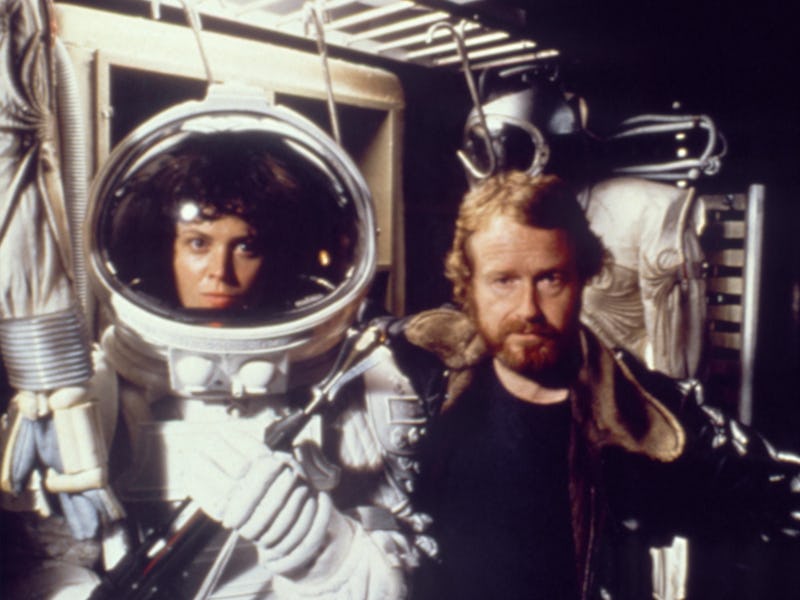Why Ridley Scott Needed the Success of Star Wars — and the Failure of Dune
The origin of Alien wasn’t pure inspiration.

Regardless of your opinion of the various sequels, prequels, and midquels to Alien, the 1979 film remains a masterpiece of science fiction cinema. Much of the atmospheric thrill of the latest film, Alien: Romulus, owes its vibes to the Ridley Scott-directed original. But, the nuanced, claustrophobic triumph didn’t just happen because Scott woke up one morning with the lore and the mood fully formed. Instead, the birth of Alien is thanks to the collision of two other science fiction titans.
As revealed by Ridley Scott in a recent interview with Letterboxd, the 1977 debut of the original Star Wars pushed the director in the direction of science fiction. “Came here [Chinese Theater in Hollywood] to see the opening night of Star Wars and I sat there, I was depressed for three months,” Scott said. The director then revealed that after his first film, The Duellists, he’d planned to follow up with an adaptation of the medieval romance Tristan and Isolde. But George Lucas’ bravado with Star Wars changed everything. “How can I be doing Tristan and Isolde when this guy does this? Did a U-turn, [was] offered Alien within six weeks.”
So, was Ridley Scott’s sense of competitive spirit with Star Wars the sole origin of Alien? Not by a long shot. The key detail is that Scott was brought on to direct Alien — a project that was already in progress at 20th Century Fox — and it wouldn’t have existed at all if Alejandro Jodorowsky’s 1975 version of Dune hadn’t crashed and burned.
Dan O’Bannon, and the birth of Alien
Dan O’Bannon in his film Dark Star (1974).
Known in the early 1970s for his daring film Dark Star, Dan O’Bannon was one of several collaborators on the ill-fated Jodorowsky version of Dune, which infamously never shot one single scene. In fact, after that version of Dune fell apart is when O’Bannon first dreamed up Alien. After collaborating with Ron Shusett, they began to pitch an early version of Alien as “Jaws in Space.” But, it’s very likely O’Bannon wouldn’t have even dreamed up the initial idea for Alien, or been looking for another project had Jodorowsky’s Dune worked out. This fact led to several folks from that abandoned Dune, working on Alien, perhaps most notably, artist H.R. Giger, who designed the xenomorph.
But, interestingly, before Scott was tapped to direct Alien, O’Bannon wanted Jodorowsky to do it. As he told Starlog in 1979: “I had worked with [H.R.] Giger on the Alejandro Jodorowsky Dune and wanted him [Jodorowsky] for Alien, but couldn’t convince Fox. Finally, when they got Ridley to direct, I showed him some of Giger’s work, and Ridley convinced Fox to approach him.”
Interestingly, at this point in the development of Alien — after 1975 but before the summer of 1977 — 20th Century Fox was reluctant to go forward with the movie at all, simply because a science fiction movie like this was a risk. But, after Star Wars became a moneymaker, Alien became viable.
Ridley Scott saved Alien
Ridley Scott, directing Alien in 1979
According to O’Bannon at the time, without Ridley Scott, the fledgling pitch for Alien would never have happened at all. “I have to really credit Ridley with saving the film at that early stage,” O’Bannon said in 1979. “Things had gone on so long without direction, that everything had started to stagnate. He really came in and pulled everything together — literally pulled it out of the ashcan.”
Essentially, what began as O’Bannon’s follow-up project to the never-made Dune, was transformed by Ridley Scott and utterly reimagined to “suit his own visual style.” Although he may have been motivated to do a big-idea science fiction film because of being “depressed” by how great Star Wars was, it's abundantly clear that Alien has nothing in common with Star Wars. Although there’s a certain 1970s sci-fi grittiness that both share, the clear reason why the movie matters so many years later is because of Scott’s artistic vision.
But, as he admits, without Star Wars he wouldn’t have been motivated toward a sci-fi movie at that time. And if Dune hadn’t been buried in the sand a few years prior, Scott wouldn’t have found the script to take him to the stars.